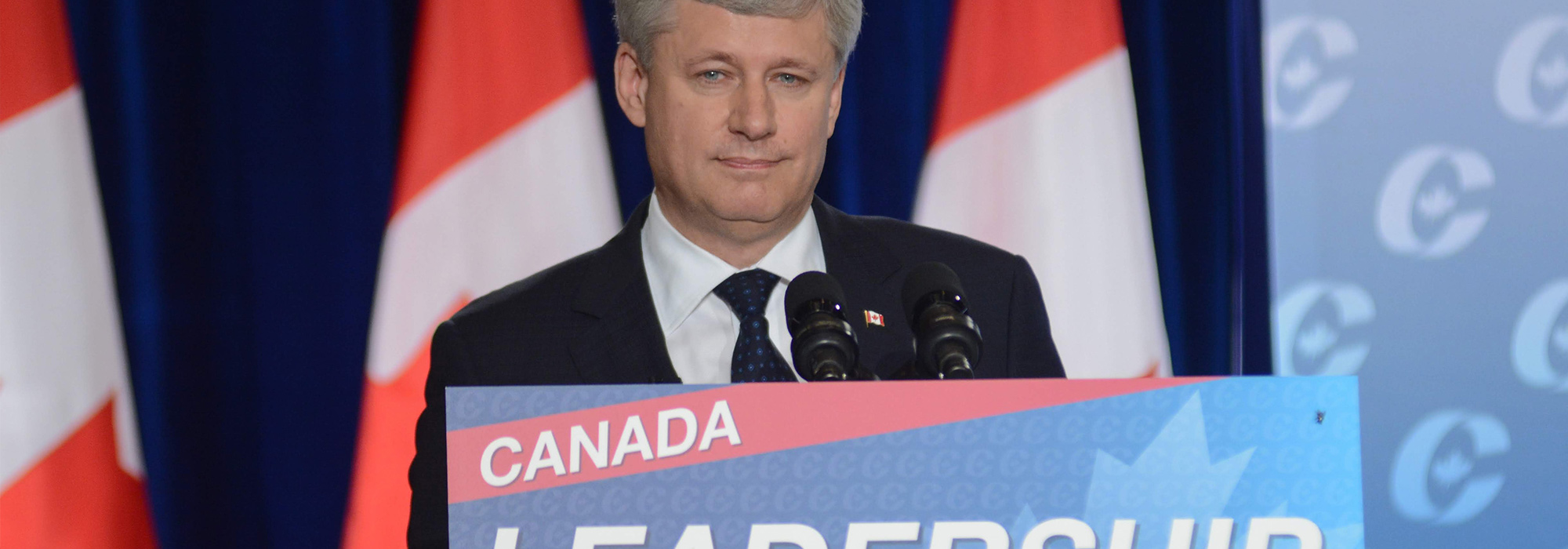
Much of Stephen Harper’s story involved a campaign against himself, against the opposition within. That opposition was the dark, vindictive side of his character — a side that at times he could not subdue, and that on several occasions, such as the government’s budget update in November 2008, threatened to bring him down.
During meetings prior to the 2008 election campaign, Harper and his strategists debated including in their platform a measure to dramatically alter political party funding. The measure would have annulled a 2003 Liberal reform that outlawed bigmoney contributions from corporations and unions, replacing them with public financing to the tune of two dollars per vote for each party.
Harper’s plan would have reprivatized funding and, since his party was far and away the better money collector, provided the Tories with a significant advantage. It was one more step along the road to the goal of supplanting the Liberals as the dominant party in the country. The Tory caucus and cabinet had approvingly debated the idea, and the question was whether to seek a mandate for the change by campaigning on it. In a decision they would come to regret, the Harper strategists mulled it over and said no. Leave it on the shelf for now.
After the election, the government passed up another opportunity by not including the plan in the Speech from the Throne. The next chance was the November 27 budget update, an occasion of greater interest than normal because of the cascading global economy. In the run-up to it, Harper and Finance Minister Jim Flaherty had difficulty squaring their projections over questions of a deficit and the need for fiscal stimulus for the economy. Harper was in Lima, Peru, at a summit of the Asia-Pacific Economic Cooperation group. The US and Britain had already moved ahead with stimulus plans to fight the recession, and Harper was hearing from other leaders who were also embarking on such initiatives.
Relations between Harper and Flaherty were not always harmonious. Harper had an economics background, knew the files, and liked to be his own finance minister. Kevin Lynch, who knew more about the nation’s finances and the global economy than Harper or Flaherty, liked to get his oar in as well.
For the budget update, it was decided that no major stimulus spending would be announced. “The fiscal update was not supposed to be a response to the economic crisis,” recalled a Harper adviser, “it was supposed to be a baseline document that put out the fiscal forecast. It wasn’t supposed to be a mini-budget with a lot of measures because there were still a lot of things in flux.”
All seemed settled between the PMO and the finance department when, at the eleventh hour, word came from Peru that something else was to be put in the update. In the previous couple of weeks, the party financing measure had again been raised, and again it seemed it would be put off. Now a BlackBerry message came from the prime minister saying party subsidies were to be eliminated. Reaction in the PMO, as one official put it, was one of much surprise, if not consternation. Harper’s advisers knew of his earlier hesitancy. While they didn’t disagree with including the measure, some of them wondered why now. Politically, things were going well. They’d just won the election handily. What was the hurry?
Surprising as well was that Harper wanted it all done in one shot. When the measure had first been debated, strategists had discussed several options. Should the subsidy be phased out slowly? Should it just be reduced by half? Should there be some pre-positioning to build support for such a measure? But the PM decided to pounce. His old instincts bubbled up. He saw a chance to cripple the enemy. He couldn’t resist.
“It’s unusual,” Tom Flanagan observed of Harper one day, “to have someone who is by nature a strategist as leader.” Put him in the confines of a minority government, said Flanagan, and “everything becomes survival and tactics.” This was a time when he might have been giving his full energies to the economic threat and a cooperative plan with the opposition to address it. Instead, Harper was thinking of partisan political advantage.
The Conservatives were well aware that during the election campaign, the NDP leader had raised the prospect of forming a coalition government, should another minority be returned. Stéphane Dion had categorically rejected the possibility, but that didn’t stop the NDP. Feeling that the Liberal leader could change his mind, they had formed a scenarios committee, and it was quietly at work throughout the campaign, analyzing various options.
At first there was disbelief in Harperland. This can’t be right, they thought. But it took hardly a few seconds to realize it was in fact right — that it was simple arithmetic and they had made a grave miscalculation. By overreaching, they had handed the opposition a dagger.
But with their increased minority, the Tories thought they had little reason to worry. The Liberals and NDP combined did not have the numbers to vote down the government. For that, they would need the Bloc Québécois. Dion had not only lost the election. He had been trounced. It wasn’t the biggest defeat in Liberal history. In four previous elections, the Liberals had scored worse than Dion’s 77 seats, the low point being 49 in 1984. But their popular vote was the lowest ever. Dion was finished, and a leadership campaign was already under way. No worries there, the Tories thought. The unsettled landscape made it a good time to go forward with the financing reform.
In delivering his fiscal update, Flaherty, an effective retail politician, lacked his customary cocky air. His body language and tone of voice gave the impression that this was a poisonous piece of work. On the opposition side, the rancour, so often fabricated, this time was genuine, and it ramped up in volume as Flaherty proceeded. The elimination of the party funding subsidy wasn’t the only provocative announcement. The budget update also included measures to suspend the right of public servants to strike and to limit women’s rights to appeal for pay equity. It was as if every second paragraph contained a hand grenade. As the derision from the opposition benches pelted his minister of finance, Harper glared arrogantly across the aisle, dismissively waving his arm at the critics. The physical gesture was something he rarely, if ever, made.
Within two hours, all three opposition leaders had pledged to vote against the package. The thought that they could lose a confidence vote didn’t bother the Tories. They believed there was no chance the Grits wanted another election now. But then, to their astonishment, came word that the Liberals and the NDP were organizing a coalition with the Bloc. That would give the opposition side sufficient numbers to topple the government and replace it.
At first there was disbelief in Harperland. This can’t be right, they thought. But it took hardly a few seconds to realize it was in fact right — that it was simple arithmetic and they had made a grave miscalculation. By overreaching, they had handed the opposition a dagger. It had the makings of a repeat of the fiasco that had claimed Joe Clark’s minority in 1979. A minority government devours itself through boneheadedness. A departing Liberal leader returns to head the government.
Battered around for so long, out of power for almost three years, the Liberals were hardpressed to contain their glee. They hadn’t even begun to think of this possibility until just a couple of days before. It had been too crazy to contemplate. They’d suffered a humiliating defeat — and yet victory appeared to be
just a breath away. The New Democrats celebrated as well. They were on the verge of sitting on the governing side, holding cabinet positions, for the first time in their history.
Brian Topp, one of Layton’s chief advisers, had a Tory contact who was close to Harper. As news of the potential coalition spread, Topp emailed the contact to let him know that he was on his way to Ottawa because, as he put it, the red button was being pushed. The Conservative replied that the opposition might want to do some quick polling. The cancellation of the funding subsidy would save the treasury $26 million, he explained, and since the country was entering a recession, voters would support that kind of measure. Topp said they weren’t worried about polls. Polls wouldn’t be necessary — not with what was being planned.
Back came the reply: “You’re gonna run the government with separatists?”
There it was. The Conservative counterattack strategy was already apparent. A coalition with separatists. But the warning didn’t register loudly enough. Topp didn’t sound the alarm to Jack Layton, who should already have known that the business with the
Bloc would have to be handled with the utmost discretion. For one thing, Topp didn’t think that Harper, who was still keen on courting Quebec and cutting into the Bloc vote, would demonize the sovereigntists. For another, he knew that Harper himself had been prepared to enter into a coalition-type arrangement with the Bloc and the NDP when the Liberals held a minority a few years earlier. He didn’t think, Topp would later write, “Harper and his team were capable of bald-faced lying.”
At the PMO, they’d spent half the night working on Harper’s response to the insurgency. On the day after the budget update, he delivered a statement in the foyer of the House of Commons. The opposition was working on a backroom deal to overturn the results of the election, the prime minister charged, and he would do everything within his legal means to stop it. “The Liberals campaigned against a coalition with the NDP,” he pointed out, “saying NDP policies were bad for the economy. And now they want to form a coalition, saying that this will strengthen the economy.” He then added, “The opposition has every right to defeat the government. But Stéphane Dion does not have the right to take power without an election.” This was an utterly groundless claim, one of several he would make throughout this crisis. Anyone who followed politics knew that in a minority Parliament there were several scenarios under which the leader of the opposition could take power without forcing another election.
The PM announced that the opposition would get an opportunity for a vote of confidence — a pledge he was shortly to renege on — but that it would be delayed by a week. The Liberals had what was called an Opposition day for the start of the following week and were preparing to move the confidence motion then. But there was a loophole in the rules. The government’s prerogative allowed Harper to impose the week’s delay. That was absolutely critical in this instance. It gave Harper the days needed for a counter-insurgency.
On Saturday, the prime minister did an about-face and withdrew his proposal to end public subsidies for political parties. It was one of the quickest reversals on a budget statement ever seen. He then began a hell-bent-forleather public relations blitz to undermine the credibility of the emerging coalition. A memorandum from chief of staff Guy Giorno urged Conservatives to “use every single tool and medium” at their disposal. It provided Tories with communications products — material for letters to the editors of newspapers, points to use on radio talk shows — to make their job easier.
But a black mood hung over the Tories and, most notably, Harper. “Everyone was depressed,” recalled an adviser. “The PM was sick. I mean, he was basically ready to throw in the towel.” No one had ever seen the usually domineering Harper so beaten down. He had once denounced Joe Clark for losing his 1979 minority because of a gasoline tax Clark had not campaigned on. Of that loss, Harper said, “You can be principled without being stupid.” It now looked as if he was about to lose his own government because of something he had not campaigned on. He had failed to heed the Clark lesson and he had failed to exercise the discipline of power for which he was known. His highly regarded strategic capacities had let him down.
On the Monday, Harper was more despondent than the others at the PMO. Some had expected him to be geared for battle. But it was the opposite. He was resigned to defeat, prepared to give up the government. Staffers had never seen him like this, pale and shaken. He told them, in so many words, that it was over, that the government would fall.
His team tried to dissuade him from this defeatist course. They argued that they had to find a way to hang on to power. “We thought,” recalled an adviser, “that once they were in office we’d lose control of events, and maybe they’d replace Dion and have a budget and win. So we felt that we had to keep control. That’s what the PM eventually felt. But he was just completely gob-smacked that weekend.”
The staff worked on changing his mood and convincing him to fight it out. It turned out that there was no need for that, however, because the coalition did it for him. Since 2002, when Harper came back to politics, events had an uncanny habit of turning his way. And now they turned his way again, as his rivals began blowing themselves up.
The coalition leaders staged a big public signing of their agreement and decided to trot out Gilles Duceppe as if he were a full partner in the enterprise. He wasn’t. The Bloc would have no cabinet seats in the proposed government. It would have no members on government committees or seats on the governing side of the chamber. The Bloc’s only participation took the form of a pledge not to vote to bring down the coalition for 18 months. But that was hardly the way it appeared. Duceppe mounted the podium with Dion and Layton and proceeded to put his signature to the document. A surreal air hung over the proceedings. The leaders of the three parties looked like a band of thieves.
“That was the moment the whole thing turned on,” recalled Kory Teneycke. “It was the moment we saw the three of them doing the signing of the accord. We knew then it was over for them. As we say, a picture is worth a thousand words.” Recalled Jack Layton, with more than a touch of understatement, “I don’t think we were sufficiently sensitive as to the impact that would have.”
Mark Cameron noticed that after that press conference a total change came over the prime minister. Defeatism turned instantly into a hunger for battle. His heart was pumping and he took command. That night, the Conservatives held their annual Christmas party. The air of defeat that had threatened to engulf the government was swept away by a politician who had never been known as the life of any party. Harper gave a rousing 45-minute speech that left long faces gleaming. Standing ovation followed standing ovation. The speech attacked the coalition as an illegitimate, separatist-propelled power grab that would not be allowed to stand if he, Stephen Harper, had anything to say about it.
Harper wrote most of the lines for that speech himself, recalled Teneycke. “More than anyone else, the PM really found his voice. You talk about those things with him, but you don’t have to write a speech like that. That one comes from within.” It was a test run of some of the lines he planned to use in the Commons the next day.
In the chamber, when Harper was in attack mode, there was a telltale sign: he slouched in his chair with chin lowered. That day, he was deeply slouched. When Dion got up to ask the first question, Harper looked like he was about to strangle him.
Dion asked when the PM would meet his pledge to have a confidence vote. The Liberal leader said it would violate fundamental constitutional principles if the prime minister did not allow one. Harper fumed. “Mr. Speaker, the highest principle of Canadian democracy is that if one wants to be prime minister, one gets one’s mandate from the Canadian people and not from Quebec separatists. The deal that the leader of the Liberal Party has made with the separatists is a betrayal of the voters of this country… and we will fight it with every means that we have.” His voice thundered and his backbenchers pounded their desks in fury.
Dion, his face reddened, said Harper hadn’t answered the question. He hadn’t. But that didn’t matter. It seldom does in the House of Commons. Harper pummelled Dion again with equal rage and the Liberal leader, with his willowy academic demeanour, couldn’t hold up. He was blown away like a sheet in a hurricane. But the opposition leaders still had a big card to play. Harper’s bid to discredit their dealings rested heavily on his contention that theirs was a “separatist coalition.” But the opposition had in hand a letter that could be used to potentially devastating effect. Dated September 9, 2004, the letter was to Governor General Adrienne Clarkson and had been signed by Harper, Layton and Duceppe. It asserted that, given the minority Liberal government, Clarkson could be asked to dissolve Parliament at any time. It read in part: “We respectfully point out that the opposition parties, who together constitute a majority in the House, have been in close consultation. We believe that should a request for dissolution arise, this should give you cause, as constitutional practice has determined, to consult the opposition leaders and consider all your options before exercising your constitutional authority.”
Layton later explained that it was a shot across the bow, “a warning to Paul Martin that he better work with the opposition parties seriously.” The NDP leader said he wouldn’t have gone through with that coalition deal because he didn’t want to make Harper prime minister. But there was no doubt in his mind, he said, that Harper, even though he had lost that election, was prepared to take over from Martin and govern a coalition. “Harper was prepared to become prime minister in some kind of relationship with the Bloc. Without question. Without question!—¨The opportunity was there for the coalitionists to paint the prime minister as a hypocrite. To counter the Harper blitz, they should have taken the letter written to Clarkson, printed it up in billboard size, and brandished it everywhere. Instead, they raised it a couple of times in the House and then let it drop.
Throughout the crisis, it was a case of one side being able to sell its message, the other side not. Force of repetition can sweep the fine points of truth away. The number of distortions, half-truths and non-truths offered by the Tories accumulated: that it was a separatist coalition, that the Liberal leader was not entitled to form a government, that the Bloc had a veto over the coalition, that the opposition would be allowed a confidence vote, that there was no Canadian flag at the coalition signing ceremony. When confronted with the latter, of photos of the Canadian flag in the chamber, the Harper men said, Oh yes, but it was off to the side. But the verities or lack thereof didn’t really matter. It was the force of their campaign. It was the decibel range. it was the Harper side knowing how to stage a propaganda blitz, the other side having no idea.
The turnaround was a magnificent show of force and bluster, a credit to Harper’s resilience and determination. He was often accused of retreating in gloom and despair when the going got tough. And it had looked for all intents and purposes on the Monday morning as if he would do just that again. But not this time. Within the space of only a few days, he was able to demonize the coalition to the point where public opinion moved in waves behind him. Rideau Hall was showered with thousands of anti-coalition missives.
The coalition partners had a case as well. They had the numbers on their side. With the Green Party also supporting them, they represented 62 percent of the vote from the last election, while the Conservatives represented slightly less than 38 percent. The coalition had to drum home that point, but they didn’t. They had to drum home the point that it was a two-party deal with peripheral support from a third. But they didn’t. Duceppe had warned the Liberals about handling it properly. When the three leaders met in Dion’s office prior to the signing ceremony, he was heard suggesting to Liberal staff that they be careful about the staging of the press conference. English Canada, Duceppe told them, would not react favourably to his presence.
Having demonstrated considerable ineptitude in the crisis thus far, the Liberals now delivered Harper another prize. On the evening of December 3, the networks had agreed to broadcast statements to the nation by Harper and Dion. (The NDP wanted Layton to speak, but one network said it wasn’t interested in presenting a “yard sale” of leaders.) Harper used his time to repeat his coalition condemnations and promise recovery measures in the new budget. Then it was Dion’s turn.
But the Liberal leader didn’t show up on time. His video arrived late. It was so late that one network didn’t bother to run it all. Not only was it late, it was also the work of amateurs. The video was grainy and unfocused. The story was that his office was so inept that it couldn’t produce a decent video.
Duceppe had warned the Liberals about handling it properly. When the three leaders met in Dion’s office prior to the signing ceremony, he was heard suggesting to Liberal staff that they be careful about the staging of the press conference. English Canada, Duceppe told them, would not react favourably to his presence.
After heckling Harper’s performance, NDPers had anxiously awaited Dion’s. They couldn’t believe what they saw. Brian Topp’s BlackBerry lit up. A message came from a supporter of Michael Ignatieff: “It’s all over dude.”
“How so?” Topp wrote back.
“The chief spokesman can’t speak.”
Harper’s next move was to back out of his promise to give the opposition a vote of confidence and instead ask the governor general to shut down Parliament, having just re-opened it a couple of weeks earlier. Harper had turned public opinion so effectively that it was now obvious to Michaëlle Jean where Canadians stood.
While mounting their public relations blitz, the PMO had specialists looking at all conceivable options for Rideau Hall. Harper’s advisers concluded that if the prime minister asked for an election, the governor general would likely turn him down. But they were quite certain that she would not turn down a request for prorogation. The PMO couldn’t communicate in advance with Rideau Hall. “But we knew the GG’s two constitutional advisers,” recalled a Harper strategist, “and we knew from talking to others and from what they had written that they were likely to offer sound advice. And we knew there was only one sound course of action.”
Most of the PM’s strategists favoured the prorogation. Kory Teneycke was one who did not. He felt that if Harper lost a confidence vote in the House, the governor general would not turn power over to the coalition — not given the Bloc involvement and where public opinion stood. There would be an election, he reasoned, and Harper would score a majority. He was ready to “bet the farm” on the GG’s not meeting the coalition’s request. “It would be cataclysmic for the monarchy in Canada,” he said, “to overturn an elected government in such a way.”
Teneycke lost the argument, but he was content in the knowledge that prorogation was a good second choice. The PMO was nearly certain that the request would be granted. “The opposition had passed the Throne Speech,” he noted. “All the advice we had was that constitutionally they had a very thin case.” Mark Cameron felt the same, though he and his colleagues started getting nervous when Harper’s meeting with Michaëlle Jean dragged on for almost two hours. When the news finally arrived that the prime minister had been granted his wish, there was a sense of relief though no great celebration.
Excerpted from Harperland: The Politics of Control, Viking Canada, 2010. By permission of the author and the publisher.
Photo: Ross Howey Photo / Shutterstock









